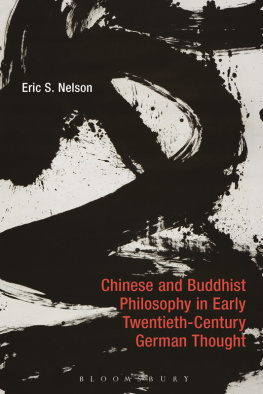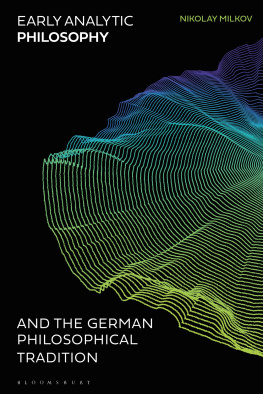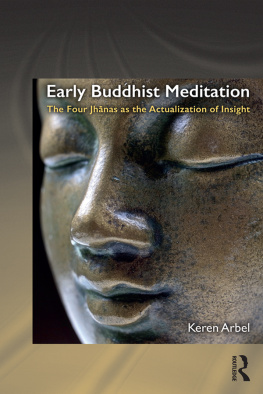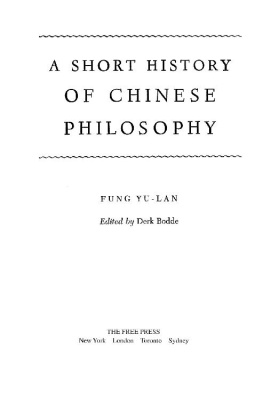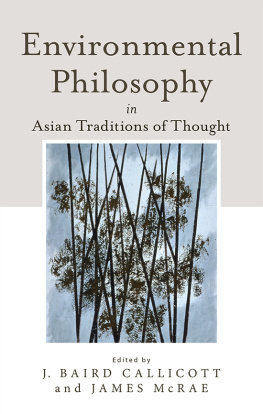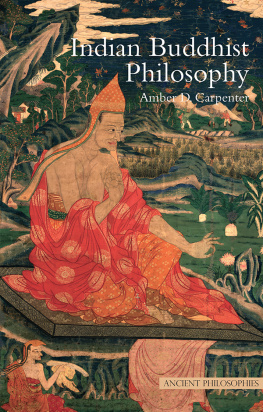Nelson - Chinese and Buddhist Philosophy in Early Twentieth-Century German Thought
Here you can read online Nelson - Chinese and Buddhist Philosophy in Early Twentieth-Century German Thought full text of the book (entire story) in english for free. Download pdf and epub, get meaning, cover and reviews about this ebook. City: New York, year: 2017, publisher: Bloomsbury UK;Bloomsbury Academic, genre: Religion. Description of the work, (preface) as well as reviews are available. Best literature library LitArk.com created for fans of good reading and offers a wide selection of genres:
Romance novel
Science fiction
Adventure
Detective
Science
History
Home and family
Prose
Art
Politics
Computer
Non-fiction
Religion
Business
Children
Humor
Choose a favorite category and find really read worthwhile books. Enjoy immersion in the world of imagination, feel the emotions of the characters or learn something new for yourself, make an fascinating discovery.
Chinese and Buddhist Philosophy in Early Twentieth-Century German Thought: summary, description and annotation
We offer to read an annotation, description, summary or preface (depends on what the author of the book "Chinese and Buddhist Philosophy in Early Twentieth-Century German Thought" wrote himself). If you haven't found the necessary information about the book — write in the comments, we will try to find it.
Nelson: author's other books
Who wrote Chinese and Buddhist Philosophy in Early Twentieth-Century German Thought? Find out the surname, the name of the author of the book and a list of all author's works by series.
Chinese and Buddhist Philosophy in Early Twentieth-Century German Thought — read online for free the complete book (whole text) full work
Below is the text of the book, divided by pages. System saving the place of the last page read, allows you to conveniently read the book "Chinese and Buddhist Philosophy in Early Twentieth-Century German Thought" online for free, without having to search again every time where you left off. Put a bookmark, and you can go to the page where you finished reading at any time.
Font size:
Interval:
Bookmark:
Chinese and Buddhist Philosophy
in Early Twentieth-Century
German Thought
Also available from Bloomsbury:
Comparative Philosophy without Borders, edited by Arindam Chakrabarti and Ralph Weber
Confucian Ethics in Western Discourse, Wai-ying Wong
Doing Philosophy Comparatively, Tim Connolly
The I Ching (Book of Changes): A Critical Translation of the Ancient Text, Geoffrey Redmond
The Public Sphere from Outside the West, edited by Divya Dwivedi and Sanil V
Chinese and Buddhist Philosophy
in Early Twentieth-Century
German Thought
Eric S. Nelson
Bloomsbury Academic
An imprint of Bloomsbury Publishing Plc

To my parents, Lydia and Richard Nelson
A work by a single author is a collective and social effort relying on a relational context of support and encouragement without which it could not arise. The biographical context of a work, too often dismissed by philosophers as irrelevant to theory, binds it to the lives of others without which what is said could never have been nor become again a saying and listening in dialogue with others. An authors words do not stand in isolation from the world of contact, encounter, and engagement, in which they echo and are adopted, consumed, or lost. I could not have begun and completed this book without the inspiration and assistance of so many teachers, family members, friends, and colleagues, all of whom cannot be named here, and it would not be the same work without the historical denial and continuing resistance to the claim that philosophicalwhether understood as conceptual, existential, or critical self-reflectivethinking happens in a variety of unique ways across different epochs and cultures.
I would like to express my heartfelt thanks to Roger Ames, Emilia Angelova, Youngsun Back, Charles Bambach, Bettina Bergo, Robert Bernasconi, Jeffrey Bernstein, Andrew Bowie, Javier Cha, David Chai, Lulu Chai, Shirley Chan, Dingdan Chen, Meilin Chinn, Chung-ying Cheng, Christian Coseru, Dan Dahlstrom, Bret Davis, William Edelglass, Owen Flanagan, Martin Gak, Namita Goswami, Saulius Geniusas, Linyu Gu, Jean-Yves Heurtebise, Kuan-Min Huang, Yong Huang, Patricia Huntington, Marzenna Jakubczak, Tao Jiang, Halla Kim, Hyeyoung Kim, Lucas Klein, Livia Kohn, Michel Kowalewicz, Sai Hang Kwok, Karyn Lai, Anita Leirfall, David Michael Levin, Chenyang Li, Xiang Liu, Ronnie Littlejohn, Xiaogan Liu, Christine Lopes, Dan Lusthaus, Rudolf Makkreel, Amnon Marom, Bill Martin, John McCumber, Hans-Georg Moeller, Bent Nielsen, Stephen Palmquist, Yuhan Pan, Ann Pang-White, Jin Y. Park, Graham Parkes, Franklin Perkins, Diane Perpich, Lauren Pfister, Franois Raffoul, Shaireen Rasheed, Frank Schalow, Martin Schnfeld, Brian Schroeder, Bongrae Seok, Iain Thomson, Kirill Thompson, Ranie Villaver, Mario Wenning, Christian Wenzel, Jason Wirth, Liu Yang, Dongming Zhao, and Krzysztof Ziarek.
Almost all of the chapters have a pre-history as lectures in East Asia, Europe, and the United States. Robin Wang was instrumental in the undertaking of this project through her invitation to speak at Peking University, where I first formulated the research project that became this book, and Hongmei Qu, who invited me to Jilin University to give five lectures on the German reception of Chinese philosophy that became the initial draft of this book. I appreciate the comments and questions from the audiences at these and other occasions where the chapters of this work were presented and developed. These exchanges helped me reconsider and rephrase a number of points.
I want to express my gratitude toward the support and encouragement of my colleagues at the Hong Kong University of Science and Technology for their kindness, openness, and professionalism. Particular thanks are owed to Charles Chan, Kim-chong Chong, Ilari Kaila, James Lee, Jianmei Liu, Billy So, Simon Wong, Shengqing Wu, and Kamming Yip. I have more gratitude than can be expressed toward those colleagues at the University of Massachusetts Lowell who sustained my spirits during a challenging period and encouraged my research in the intersections of Asian, Continental European, and intercultural philosophy: Christa Hodapp, R. Eugene Mellican, Bassam Romaya, and P. Christopher Smith.
I have great appreciation for the students in my postgraduate courses at HKUST on Phenomenology (fall 2014), Philosophy of Religion: East and West (spring 2016), and Fundamentals of Comparative Philosophy (spring 2017). Some of the ideas presented in this work were further developed in dialogue and conversation with them. I also thank Xiaoran Chen in helping to create the bibliography, and David, Yuxue Fang, and Mengying Zhang for helping with the manuscript.
I am also grateful to my family for their being there and their toleration of my philosophical and other eccentric inclinations, in particular Rick, Jenny, and Dean Nelson.
This book could not have become what it is without Bloomsbury Press and its editors. I am grateful to Colleen Coalter, Jason Ceo, Andrew Wardell, and many others for assisting to bring this work into print. The missteps and mistakes occurring in this work are my own responsibility.
Earlier versions of the following chapters and chapter sections appeared in print in the following publications:
The first half of draws on: The Question of Resentment in Western and Confucian Philosophy, in Jeanne Riou and Mary Gallagher (eds.), Re-thinking Ressentiment: On the Limits of Criticism and the Limits of its Critics (Bielefeld: Transcript Verlag, 2016), 3352; the second half of the chapter draws on Recognition and Resentment in the Confucian Analects. Journal of Chinese Philosophy 41.2 (2013): 287306.
: Technology and the Way: Buber, Heidegger, and Daoism. Journal of Chinese Philosophy 41.34 (2014): 307327. Chinese Version: Keji he Dao: Bubo, Hadegeer he Daojia , Changbai xuekan (Changbai Journal), no. 1 (2014): 512.
: Heidegger, Misch, and the Origins of Philosophy. Journal of Chinese Philosophy 39.Supplemental Issue (2012): 1030.
The section Phenomenology as movement and way in was drawn on for: Retrieving Phenomenology: Introduction to the Special Theme Issue. Frontiers of Philosophy in China 11.3 (2016): 329337.
: Demystifying Experience: Nothingness and Sacredness in Heidegger and Chan Buddhism. Angelaki 17.3 (September 2012): 6577 and Language and Emptiness in Chan Buddhism and the Early Heidegger. Journal of Chinese Philosophy 37.3 (2010): 472492.
We should not be ashamed to acknowledge truth from whatever source it comes to us, even if it is brought to us by former generations and foreign peoples. For him who seeks the truth there is nothing of higher value than truth itself.
Abu Ysuf Yaqb ibn Isq a-abb al-Kind
East and West are nothing more than names applied to this or that place according to the situation. There is no such thing as occupying the center and determining East and West. If we do not respect the Way of the Buddha because he is a barbarian, then shall we also not respect the ways of Shun, who was born among the Eastern tribes, and King Wen, who was born among the Western tribes? Can we disparage a persons Way just on the basis of his being foreign?
Gihwa
Introduction
The work before you is an interpretive journey through the historical reception of Chinese and Buddhist philosophy in modern German thought, focusing in particularalbeit not exclusivelyon the early twentieth century. Its intent is to describe and analyze the intertextual nexus of intersecting sources for the sake of elucidating implications and critical models for intercultural hermeneutics and intercultural philosophy. The possibility of such a philosophy is confronted by the persistent myth and prejudice that philosophy is and can only be a unique and exclusive Western spiritual achievement.
Next pageFont size:
Interval:
Bookmark:
Similar books «Chinese and Buddhist Philosophy in Early Twentieth-Century German Thought»
Look at similar books to Chinese and Buddhist Philosophy in Early Twentieth-Century German Thought. We have selected literature similar in name and meaning in the hope of providing readers with more options to find new, interesting, not yet read works.
Discussion, reviews of the book Chinese and Buddhist Philosophy in Early Twentieth-Century German Thought and just readers' own opinions. Leave your comments, write what you think about the work, its meaning or the main characters. Specify what exactly you liked and what you didn't like, and why you think so.

